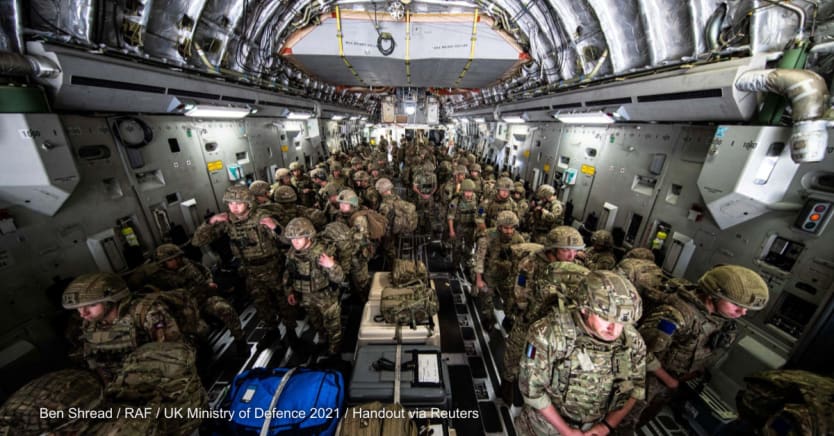
Development organizations are urgently calling for the United Kingdom’s Afghan relocation policy to be expanded amid fears that aid workers who supported U.K.-funded programs are being “hunted down” by the Taliban.
Concerns are growing for the safety of Afghans who worked to help their country’s development — but many do not qualify for the U.K. relocation program because of rules excluding subcontractors.
Raab: UK could withhold aid to Afghanistan to hold Taliban to account
While politicians from various parties have suggested increasing aid and planning to help Afghans, Foreign Secretary Dominic Raab suggests the U.K. aid budget could be withheld to hold the Taliban to account.
“I’ve had many cases of people saying they face specific threats because they worked on projects funded by the U.K. government,” said Daniel Pimlott, director at Adam Smith International, an international development consultancy that worked in the country between 2002 and 2018. “[The Taliban] are hunting people down … because anyone who worked on a foreign-funded project is at risk and is seen as an agent of the [United States].”
While not directly employed by the government, many Afghan development workers were employed on U.K. aid-funded projects and became closely associated with the U.K. because of their jobs — which they often took on through NGOs and companies funded by British aid to carry out development work.
“I’d argue that the high profile [that] many of the civil society activists have got has been generated partly by the support of funding given to them by not just the British but other governments, taking them to conferences, asking them to do media work, etc.,” Elizabeth Winter, executive director at British & Irish Agencies Afghanistan Group, told Devex.
Others had more innocuous jobs, such as office managers, but are still being strongly threatened by the Taliban, according to Pimlott.
However, these people have been excluded from seeking help under the U.K. Afghan Relocation and Assistance Policy, known as ARAP, as they are not classified as “Locally Employed Staff” by the government. The program is run by the Ministry of Defence, which declined to comment.
Former Veterans Minister Johnny Mercer tweeted Tuesday that “Ministers took deliberate decisions that made it [the ARAP process] harder - I was there.” The Home Office is soon expected to announce a new system for accepting Afghan refugees, but it was unclear Tuesday if this would particularly help development workers.
The number of Afghan development workers who are at risk is unknown but is estimated by Winter and Pimlott to be in the thousands. Winter said organizations have been “scrambling” to help their staffers, though many have not wanted to speak publicly with Devex about the matter.
Pimlott told Devex he was “really worried” about former ASI workers “coming to harm soon,” with some having apparently been tracked by the Taliban for a long time. He said around 120 Afghans who had worked for the organization had been in contact to ask for help with relocation and around 20 to 30 appeared to be at “imminent risk of harm or death.”
He said much of the work done by Afghans — ASI ran numerous projects, including those related to local governance, budget reform, and technical assistance on taxes — “was clearly under the banner of DFID [Department for International Development] and very clearly associated with the U.K. government.” The Foreign, Commonwealth & Development Office, DFID’s successor department, directed inquiries to the Ministry of Defence.
“There’s not even really a way of applying [to ARAP]; the format of the paperwork doesn’t even allow you to say, ‘I worked on an aid-funded project,’” Pimlott said. “When our staff have applied to [the] ARAP scheme, they have been rejected on an ... automated basis because the paperwork doesn’t allow you to apply if [you’re] working on a U.K. aid-funded project or worked in one of those categories.” He said the system “needs to be changed” to allow for the evacuation of those in imminent danger.
“[The Taliban] are hunting people down … because anyone who worked on a foreign-funded project is at risk and is seen as an agent of the [United States].”
— Daniel Pimlott, director, Adam Smith InternationalDeveloping Afghanistan, particularly the country’s local government structures and civil society, was a key aspect of the U.S. and U.K. intervention in the country. The U.K. spent a total of around £3.5 billion in aid to the country between 1999 and 2019, according to an analysis by Euan Ritchie, a policy analyst at the Center for Global Development.
While aid to the country has been declining in recent years, it has been further reduced as part of the wider U.K. aid budget cuts. Foreign Secretary Dominic Raab told the BBC Tuesday that he was considering increasing aid to the country — “probably by 10% on last year.” He gave no further details about how the money would be spent or if it would mean reduced funding for other U.K. development projects.








